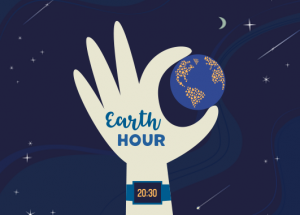Earth Hour: Let’s Embrace The Darkness for an Hour To Light Up The Ages
Earth Hour: Let’s Embrace The Darkness for an Hour To Light Up The Ages
 In 2007, what started as a simple “lights-off” movement in Sydney has grown dramatically and made its way to more than 180 countries today. Over the years, Earth hour has come a long way. For the uninitiated ones, Earth Hour is an annual event which encourages people across the globe to turn off lights for one hour in their homes, offices and buildings, as a symbolic act of taking better care of this planet. The organisation behind this brilliant idea and event is World Wildlife Fund (WWF).
In 2007, what started as a simple “lights-off” movement in Sydney has grown dramatically and made its way to more than 180 countries today. Over the years, Earth hour has come a long way. For the uninitiated ones, Earth Hour is an annual event which encourages people across the globe to turn off lights for one hour in their homes, offices and buildings, as a symbolic act of taking better care of this planet. The organisation behind this brilliant idea and event is World Wildlife Fund (WWF).
Earth Hour 2017 saw cities with famous landmarks and monuments from around the world such as the U.N headquarters in New York, Big Ben in London, the Eiffel Tower, Sydney’s famous Opera House and others dimming their lights as a symbol of unity for this event. We expect to see the same level of zeal and enthusiasm this year as well.
When is it being celebrated?
This year it is being observed on 24 March 2018 from 8:30 pm to 9:30 pm.
Why is Earth Hour important?
Today, global warming and climate change are not just words related to some scientific research paper. Both have emerged as a real threat to our planet. With the ever rising population, number of cars on the road and carbon footprints throughout the ecosystem, the initiatives like Earth Hour are exactly what we need today.
We as human beings have been affecting our ecosystem and putting ourselves as well as other species at a great risk. Though the industries are the bigger culprits in this case, and international treaties like the Paris Agreement is doing its job in putting a leash on them, we too are responsible citizens who must come forward in order to save our planet.
With Earth Hour, the WWF aims to engage people across the globe to adopt a more sustainable lifestyle. Turning off lights for an hour is just a reminder of the fact that if we do not change how we consume our resources, the dark age is not very far. 2016 was recorded as the hottest year for the third year in a row, which signals towards the ever-increasing impact of global warming. Keeping this in mind, WWF is taking Earth Hour even further by encouraging people to cut on fuel, food wastage, plastic usage, etc.
How can I contribute to Earth Hour every day?
• Commute by public transport and cycle as much as possible.
• Turn off the lights and other appliances whenever not in use.
• Switch to solar energy and sustainable LED bulbs.
• Recycle paper and plastic bags as many times as possible.
• Reduce food wastage. Buy consciously.
• Talk about Earth Hour on social media and spread the importance of this message
Everything mentioned above is just a speck of the action that we all need to take if we want to pass on a healthy planet to our future generations. This Earth Hour, let us all take a pledge to do our best to make this edition an even bigger success than it has been in earlier years. It’s time to deliver the action needed to protect the planet.
